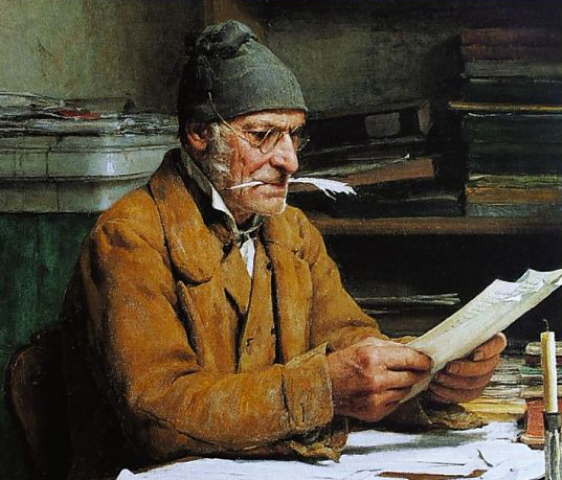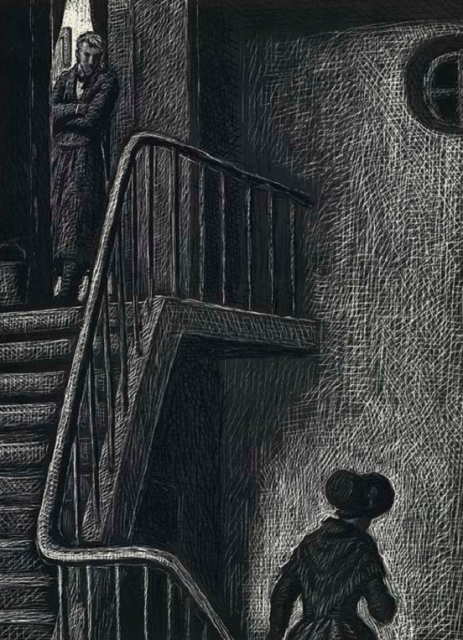
21.12.2022
The confession of a former St Petersburg official and at the same time a philosophical tale about human nature, the nature of our desires and ‘wills’ and the relationship between reason and the will. In the first part the hero, “underground man”, deprived of his name and surname, argues with imaginary and real opponents, reflects on the root causes of human actions, on progress and civilization. In the second part, theory is replaced by practice: the hero recounts a scandalous friendly dinner and his trip to a brothel, where he meets the prostitute Lisa. The ideological core of “Notes from the Underground” is the hero’s dispute with the most famous scientific theories of the mid 19th century (from Malthus to Darwin and Sechenov) and the hidden idea of Dostoevsky himself of the need for Christian faith and self-denial, the only guarantees of peaceful human life.
When was it written?
Between January and May 1864. This was a happy and at the same time dramatic period in Dostoevsky’s life: after his return from penal servitude and exile he gained literary fame once more and began publishing the magazine Vremya. But in these months came the illness and death of Dostoevsky’s first wife Maria Dmitrievna (she died on April 15, 1864). With his novella, Dostoevsky continued the artistic development of his own ideological direction – that of the “nobility” outlined in Notes from the Dead House and in the programme articles of Vremya. Unlike the previous, documentary Notes, Notes from the Underground was more reminiscent of another genre that became widespread in those years – the ideological novel. By 1864 this genre was already represented by Mikhail Avdeev’s Podvodnyi Kamen, Turgenev’s Fathers and Children, Chernyshev’s Chto delat? Chernyshevsky and Pisemsky’s The Troubled Sea. “Notes from the Underground” is embedded in this series, continuing the debate about the phenomenon of Russian nihilism and the “new man”.



How is it written?
The style of Notes from underground struck contemporaries with the sickly and nervous, on the edge of pathology, intonation of the narrator, confused and verbose about himself and the world. Mikhail Bakhtin, a major Russian philologist of the twentieth century, described this manner as ‘the word with a loophole’. What it is, it is clear already from the first phrases of the story: “I am a sick man… I am an evil man. I am an unattractive person. I think my liver hurts. However, I don’t know a thing about my illness and I don’t know what’s wrong with me”. Here the protagonist, by varying the same thought, suddenly disproves himself, thus showing the unpredictability and unknowability of his own ego even to himself. At the same time, the hero can always find a loophole – a rhetorical trick, a twist, an excuse, a caveat, a lie – to evade the questions posed to himself. Dostoevsky was well aware of the effect he was trying to achieve, and in a letter to his brother on March 20, 1864, he characterized the story thus: “Its tone is too strange, and its tone is harsh and wild: it might not please him; consequently, poetry should soften and bear everything. And in another letter he called such a style “chatter”: “You understand the transition in music. It’s exactly the same here. In chapter 1 it seems to be chatter, but suddenly this chatter is resolved in the last 2 chapters by an unexpected catastrophe”.



The sharp contrast, the counterpoint to which Dostoevsky points, is another peculiarity of the structure and narrative style of Notes. It is very accurately diagnosed by “ordinary” readers when they complain about the plotlessness of the first part and the thrilling dynamism of the second. This contrast in pace, rhythm and volume of the narrative voice would become a hallmark of Dostoevsky’s all subsequent novels, the first of which, Crime and Punishment, would appear two years after Notes from the Underground.
What influenced it?
As is often the case with Dostoevsky, several powerful Russian and European literary traditions intersected in the artistic world of Notes. In creating the confessional narrative of “one of the characters of recent times,” Dostoevsky inherited the tradition of the psychological confessional prose of the 1850s, and especially its central work, Turgenev’s Diary of an Extra Man (1850). Its protagonist, Chulkaturin, is a direct predecessor of the underground paradoxalist both in his morbid irritability and in the way he reasons about himself and what a loser he turns out to be. However, the psychology of Dostoevsky’s protagonist is much more refined: he goes deeper and more deeply into his own experience. Dostoevsky’s reference to several European authors helped him achieve this. First and foremost is Jean-Jacques Rousseau’s Confessions, mentioned in Notes. In the protracted arguments and sophisticated eloquence of the hero of “Notes” one can guess the dialogic form of Denis Diderot’s “Rameau’s Nephew”. The familiarity of the hero of Notes with the latest scientific and philosophical ideas of the 1830s-50s is remarkable: Dostoevsky responds to the theories of French and British utopians (Henri Saint-Simon, Etienne Cabet, Pierre Leroux, Felicite Robert de Lamenet, Charles Fourier, Robert Owen), the “positive” sociology of Auguste Comte, Henry Bockl’s conception of civilization, the individualist philosophy of Max Stirner, the evolutionism of Charles Darwin.



Interestingly enough, the immediate impetus for the first part was a famous article by the physiologist Ivan Sechenov entitled “Brain Reflexes”, which Dostoevsky had read in the autumn of 1863 in the “Medical Gazette” and left a note about it in his notebook. The writer was unpleasantly struck by Sechenov’s idea, rather daring for its time, that the free will of man, able to control his body and emotions, is in fact only a manifestation of the complex chains of reflexes in the brain. It is noteworthy that Sechenov repeatedly used the word “want” to designate this very free will, which becomes one of the key words in the philosophy of the “underground man. It is safe to say that the following words of his contain a hint of the Russian physiologist’s theory:
“Ha-ha-ha! But you don’t really want to, if you like! – Science has even nowadays managed to raznatomiruyut man that even now we know that want and so-called free will is nothing else than”.
It is easy to surmise that Dostoevsky’s hero in the place of the dotted line is referring to the “reflexes of the brain” – the most striking and scandalous discovery of Russian physiology in the 1860s.
How was it published?
The tale appeared in issues 1, 2 and 4 of the Dostoevsky brothers’ magazine Epoch, launched after the suspension of Vremya. Like other texts by the writer, Notes from Underground was composed and published in portions, which influenced the layout of the text. Thus, the first part of the story was published in the end of March, while the fourth part was published only on June 7, 1864. The break in work was caused by the death of Dostoevsky’s wife – he finished the second part of the story in a hurry in May.
Dostoevsky republished the story only twice: it was included in the second volume of his collected works in 1865 and was published as a separate edition in 1866 (edition by F.Stellovsky). Later, the writer did not include “Notes” in any lifetime editions.




